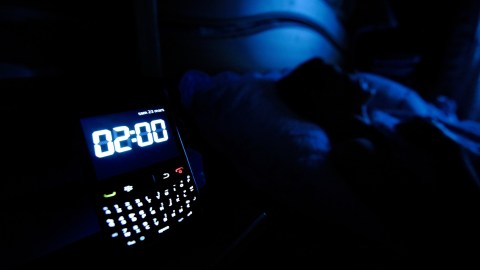What Happens When We Check Our Smartphones before Bed?

Many of us have heard the medical advice that we shouldn’t check our electronic devices before bed. It disrupts our sleep. Other than setting back our biological clocks a bit, what harm could checking Facebook before bed have on my health?
A lot, according to a new video released by Business Insider. There’s a dangerous chain reaction this habit sets in motion. Dr. Daniel Siegel walks viewers through what happens when we take out our phones right before bed.
;
The light from a smartphone releases a stream of photons, telling our brains not to secrete melatonin — the chemical responsible for making us feel tired. So, we feel awake, and this leads us to continue to browse our smartphones, because why not? We’re still awake. This leads us to clock in less hours of sleep each night.
Scientists are beginning to discover just how important sleep is to maintaining our physical and mental wellbeing. Deepak Chopra, co-founder of The Chopra Center for Wellbeing, says, “Seven to eight hours of sleep every night without drugs or induced by alcohol, is absolutely essential for your body to remain in good health, to remove the amyloid from your brain that causes premature dementia and Alzheimer’s and to actually self-regulate the cellular activity in your entire body.”
At night, the glial cells are doing their work, cleaning up the toxins that our neurons produce. Scientists have found a link between poor sleep and Alzheimer’s disease, saying that it’s caused by a breakdown in the brain’s several disposal processes.
For the vast majority of us, we need our seven to nine hours of sleep in order to clean out these toxic chemicals in our brains, allowing us to maintain mental and physical health for the day and years ahead. Siegel recommends giving ourselves an hour buffer between our electronic screens and bed time, advice I’m going to heed.
***
Natalie has been writing professionally for about 6 years. After graduating from Ithaca College with a degree in Feature Writing, she snagged a job at PCMag.com where she had the opportunity to review all the latest consumer gadgets. Since then she has become a writer for hire, freelancing for various websites. In her spare time, you may find her riding her motorcycle, reading YA novels, hiking, or playing video games. Follow her on Twitter: @nat_schumaker
Photo Credit: AFP / Stringer/ Getty





